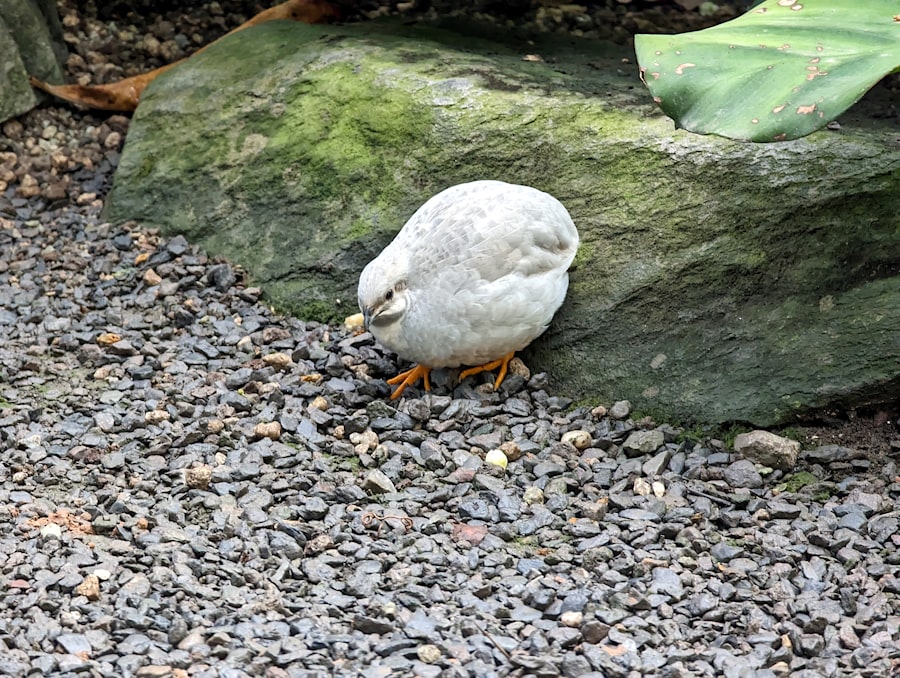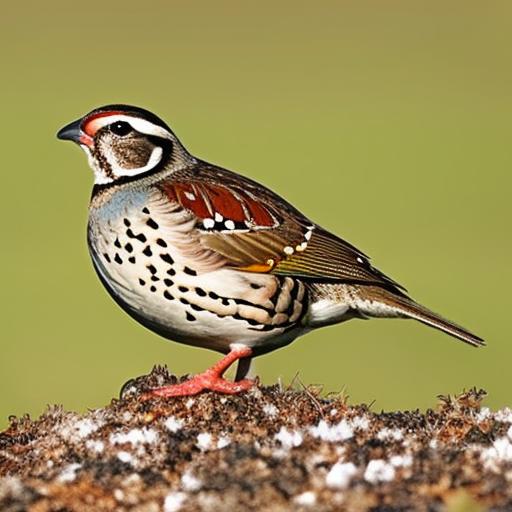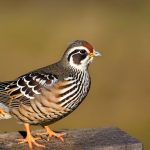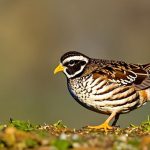Quails are small birds that require a safe and secure housing environment. When it comes to housing quails, it’s important to provide them with enough space to move around and exercise. A good rule of thumb is to allow at least 1 square foot of space per quail. This means that a small flock of quails will need a relatively large enclosure to ensure their well-being. The enclosure should also be well-ventilated to prevent the buildup of ammonia from their droppings, which can be harmful to their respiratory system. Additionally, the enclosure should be predator-proof, with sturdy walls and a secure roof to keep out potential threats such as raccoons, foxes, and birds of prey.
Quails are ground-dwelling birds, so their enclosure should have a solid floor to prevent them from escaping or being attacked by predators. The floor can be covered with a layer of straw or wood shavings to provide a comfortable surface for the quails to walk on and to absorb their droppings. It’s also important to provide the quails with shelter from the elements, such as a small coop or hut where they can roost and seek refuge from extreme weather conditions. The enclosure should also have access to natural light, as well as areas of shade to allow the quails to regulate their body temperature. Overall, the housing and enclosure for quails should prioritize their safety, comfort, and well-being.
Key Takeaways
- Proper housing and enclosure is essential for quail to thrive, with adequate space, ventilation, and protection from predators.
- Quail require a balanced diet of high-quality feed, supplemented with grit and calcium for optimal nutrition and health.
- Regular health checks, parasite control, and access to clean water are crucial for maintaining the wellness of quail.
- Breeding and incubation require careful monitoring of temperature, humidity, and turning of eggs for successful hatching.
- Predator protection measures such as secure enclosures, netting, and predator deterrents are necessary to safeguard quail from harm.
- Gentle and careful egg collection and handling is important to prevent damage and ensure the viability of the eggs.
- Socialization and enrichment activities, such as dust baths and perches, are important for the mental and physical well-being of quail.
Feeding and Nutrition
Quails are omnivorous birds that require a balanced diet to stay healthy and productive. In the wild, quails feed on a variety of foods, including seeds, grains, insects, and small invertebrates. When kept in captivity, it’s important to provide them with a commercial quail feed that is specifically formulated to meet their nutritional needs. Quail feed typically contains a mix of grains, seeds, and protein sources such as soybean meal or fish meal. It’s important to choose a high-quality feed that is appropriate for the age and purpose of the quails, whether they are being raised for meat or eggs.
In addition to commercial feed, quails can also benefit from supplemental treats such as fresh fruits and vegetables, mealworms, and greens. These treats can provide additional nutrients and enrichment for the quails, but it’s important not to overdo it, as too many treats can upset the balance of their diet. Quails also need access to clean, fresh water at all times, especially during hot weather or when they are laying eggs. Water should be provided in shallow dishes or drinkers that are easy for the quails to access without getting wet or soiled. Overall, providing quails with a balanced diet and access to clean water is essential for their health and well-being.
Health and Wellness
Maintaining the health and wellness of quails is essential for their overall well-being and productivity. Like all animals, quails are susceptible to a variety of health issues, including respiratory infections, parasites, and injuries. To keep quails healthy, it’s important to provide them with a clean and sanitary living environment. This includes regularly cleaning their enclosure, removing soiled bedding, and providing fresh water and feed. It’s also important to monitor the quails for any signs of illness or injury, such as lethargy, loss of appetite, or abnormal behavior.
In addition to proper housing and nutrition, quails also benefit from regular health checks and preventative care. This can include routine vaccinations, deworming, and parasite control to prevent common health issues. It’s also important to handle quails gently and minimize stress, as stress can weaken their immune system and make them more susceptible to illness. If a quail does become sick or injured, it’s important to seek veterinary care from a professional who is experienced in treating poultry. Overall, maintaining the health and wellness of quails requires diligence, observation, and proactive care to ensure that they thrive in captivity.
Breeding and Incubation
Breeding quails can be a rewarding endeavor for poultry enthusiasts, but it requires careful planning and attention to detail. Quails reach sexual maturity at around 6-8 weeks of age, at which point they can begin mating and laying eggs. When breeding quails, it’s important to provide them with a suitable nesting area where they can lay their eggs in privacy. This can be a simple box or sheltered area filled with soft bedding material such as straw or wood shavings. It’s also important to provide a balanced diet and proper nutrition for breeding quails to ensure that they are healthy and productive.
Once the quails have laid their eggs, they can be collected and placed in an incubator for hatching. Quail eggs typically take around 17-18 days to hatch, during which time they require consistent temperature and humidity levels. It’s important to carefully monitor the incubation process and make any necessary adjustments to ensure a successful hatch. Once the eggs hatch, the chicks will need to be kept warm and provided with a suitable brooding area until they are old enough to join the rest of the flock. Breeding and incubating quails requires patience, attention to detail, and a commitment to providing the best possible care for the birds and their offspring.
Predator Protection
Quails are small birds that are vulnerable to predation from a variety of animals, including mammals, birds of prey, and domestic pets. To protect quails from predators, it’s important to take proactive measures to secure their housing and enclosure. This can include using sturdy wire mesh or fencing with small openings to prevent predators from gaining access to the quails. It’s also important to reinforce the walls and roof of the enclosure to prevent predators from digging under or breaking through weak spots.
In addition to securing the enclosure, it’s important to be vigilant about potential threats from predators in the surrounding area. This can include keeping an eye out for signs of predators such as tracks or droppings, as well as taking steps to deter predators from approaching the quail enclosure. This can include using deterrents such as motion-activated lights or sound devices, as well as keeping the area around the enclosure clear of potential hiding spots for predators. Overall, protecting quails from predators requires a combination of secure housing and proactive measures to minimize the risk of predation.
Egg Collection and Handling

Collecting and handling quail eggs requires care and attention to ensure that they remain clean and viable for hatching or consumption. Quail eggs are typically laid in nesting boxes or sheltered areas within the enclosure, where they should be collected daily to prevent them from being damaged or soiled. It’s important to handle quail eggs gently and avoid shaking or jostling them, as this can damage the delicate shells and reduce their quality.
Once collected, quail eggs should be stored in a cool, dry place with consistent temperature and humidity levels. This can help prolong their freshness and viability if they are being saved for hatching or consumption. When handling quail eggs for consumption, it’s important to wash them thoroughly before use to remove any dirt or bacteria that may be present on the shell. Quail eggs can be used in a variety of culinary applications, including baking, frying, or boiling, and they are prized for their rich flavor and nutritional value. Overall, collecting and handling quail eggs requires attention to detail and proper storage to ensure their quality and safety.
Quail Socialization and Enrichment
Quails are social birds that benefit from interaction with their flock mates as well as enrichment activities that stimulate their natural behaviors. When raising quails in captivity, it’s important to provide them with opportunities for socialization and enrichment to keep them mentally and physically healthy. This can include providing them with plenty of space to move around and exercise within their enclosure, as well as opportunities for dust bathing and foraging for insects or treats.
In addition to physical enrichment, quails can also benefit from social interaction with their flock mates. This can include providing them with suitable roosting areas where they can rest together at night, as well as opportunities for mating and nesting behaviors during the breeding season. Providing quails with a diverse environment that mimics their natural habitat can help reduce stress and boredom while promoting their overall well-being. Overall, socialization and enrichment are essential components of caring for quails in captivity, helping them lead happy and fulfilling lives in a domestic setting.
In addition to physical enrichment, quails can also benefit from social interaction with their flock mates. This can include providing them with suitable roosting areas where they can rest together at night, as well as opportunities for mating and nesting behaviors during the breeding season. Providing quails with a diverse environment that mimics their natural habitat can help reduce stress and boredom while promoting their overall well-being. Overall, socialization and enrichment are essential components of caring for quails in captivity, helping them lead happy and fulfilling lives in a domestic setting.
If you’re interested in learning more about how to keep quail, you might also find our article on creating the perfect floor for a chicken coop helpful. Understanding the importance of a well-designed coop floor can provide valuable insights into creating a suitable environment for quail. Check out the article here for more information.
FAQs
What are some basic requirements for keeping quail?
Quail require a suitable living space, such as a cage or aviary, with proper ventilation and protection from predators. They also need access to clean water, a balanced diet, and a suitable nesting area.
What should I feed my quail?
Quail should be fed a balanced diet that includes a high-quality commercial quail feed, as well as fresh fruits and vegetables. They also require access to grit and calcium to aid in digestion and egg production.
How do I provide suitable housing for quail?
Quail housing should provide enough space for the birds to move around comfortably, as well as protection from the elements and predators. The flooring should be covered with a suitable bedding material, such as straw or wood shavings.
What are some common health issues for quail?
Common health issues for quail include respiratory infections, parasites, and injuries from pecking or fighting. It’s important to monitor the health of your quail and seek veterinary care if necessary.
How do I ensure the well-being of my quail?
To ensure the well-being of your quail, provide them with a clean and comfortable living environment, a balanced diet, and regular access to fresh water. It’s also important to monitor their health and behavior regularly.
Meet Walter, the feathered-friend fanatic of Florida! Nestled in the sunshine state, Walter struts through life with his feathered companions, clucking his way to happiness. With a coop that’s fancier than a five-star hotel, he’s the Don Juan of the chicken world. When he’s not teaching his hens to do the cha-cha, you’ll find him in a heated debate with his prized rooster, Sir Clucks-a-Lot. Walter’s poultry passion is no yolk; he’s the sunny-side-up guy you never knew you needed in your flock of friends!







